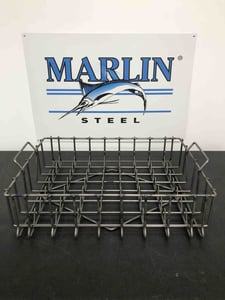 There are many different polymers that can be applied to a custom wire basket to improve its resilience or ability to hold delicate parts. However, because there are so many types of coatings for baskets, it can often be difficult to find the right one for a particular job. Choosing the best steel wire basket coating depends on a variety of factors, such as:
There are many different polymers that can be applied to a custom wire basket to improve its resilience or ability to hold delicate parts. However, because there are so many types of coatings for baskets, it can often be difficult to find the right one for a particular job. Choosing the best steel wire basket coating depends on a variety of factors, such as:
- The specific chemicals to be encountered;
- The process’ operating temperatures;
- How likely the coating is to “rub off” on held parts;
- How delicate the parts being processed are;
- Whether the basket needs complete protection or partial;
- Whether the basket has moving parts; and
- How the basket is moved between processes (some coatings restrict sliding).
Polypropylene coatings are a popular choice for many custom wire basket applications. Why is polypropylene material so useful for coating custom wire baskets?
While not as well-known as polyvinyl chloride (PVC), polypropylene materials for coating baskets provide a few distinct advantages.
Reason to Use Polypropylene #1: To Hold Delicate Parts
One key polypropylene material property to consider is its semi-soft surface. On the Rockwell R scale, polypropylene coating scores a 92—putting it on the high end of the softer materials graded on that scale. What this means is that polypropylene tends to absorb shocks rather than redistribute them to whatever else it is in contact with.
This is indispensable for processing delicate parts such as glass tubes, crystal components, or automotive parts with a “no scratch” requirement.
Reason to Use Polypropylene #2: Because the Baskets Will Hold Heavy Parts
Polypropylene has a very high tensile strength compared to most polymers—around 4,800 psi. While this is much lower than the tensile strength of steel (which varies depending on formulation, but is usually over ten times as strong), it is important for helping the coating hold together when the basket is used to hold heavy parts.
Reason to Use Polypropylene #3: Because It’s Nearly Waterproof
The composition of polypropylene materials is dense enough to make it almost completely impervious to water. A sample of polypropylene immersed in water for 24 hours will absorb less than 0.01% of its weight in water—and polypropylene is a lightweight material.
This makes polypropylene materials extremely useful for sealing a custom wire form from exposure to liquids. Combined with the softness of polypropylene, it becomes an ideal basket coating for ultrasonic parts cleaning applications.
Reason to Use Polypropylene #4: It Can Bend without Breaking
As noted by Creative Mechanisms, “Polypropylene is uniquely adept for living hinges because it does not break when repeatedly bent. One of the other advantages is that polypropylene can be CNC machined to include a living hinge.”
For lightweight applications, this flexibility can be useful for allowing the inclusion of a hinged lid—though the polypropylene material won’t be strong enough to hold the weight of a metal lid on its own for long.
When NOT to Use Polypropylene
As useful as polypropylene materials can be for coating wire baskets, they aren’t always the best solution for a job.
Some reasons why you wouldn’t want to use polypropylene include:
- Your Application Involves Frequent Heavy Impacts. While the tensile strength and flexibility of polypropylene are both quite high, the material is far from invincible. It can easily deform or be sheared away by strong impacts with hard objects.
- Your Application Involves Oxidizing Acids, Chlorinated Hydrocarbons, and/or Aromatics. While polypropylene can repel most organic solvents, acids, and alkalines, it is susceptible to a few specific compounds—such as oxidizing acids and chlorinated hydrocarbons.
- Your Application Involves High Temperatures. Like many polymers, polypropylene is susceptible to melting at high temperatures. Even temperatures around 180˚F (82.2˚C) can cause the material’s performance to degrade—and it melts at 327˚F (163.8˚C).
Do polypropylene material properties match up with your custom basket’s requirements? Get a professional opinion by reaching out to the Marlin Steel team to discuss your custom basket application.


.gif)


